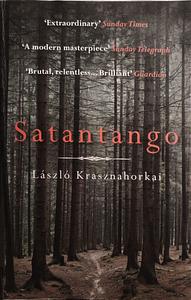Take a photo of a barcode or cover
Reading this with The Brothers Karamazov was particular gruelling during our Yuletide season of cheer haha. I guess I wanted to stay grounded. Anyway, thematically, and at a meta context, though not a Maximalist work, since it’s less than 1/3 the size of Brothers—it still manages to hit similar themes and deploys some similar literary devices, and, in my opinion, is the better book in every evaluation of the craft. (Including, not being 1000 pages to do it).
Rumination on the ignorance and grotesque manner people are twisted by what they believe in, especially when aligned with social constructs. Faith, belief, whatever, all are put into the microscope of multiple perspectives and done so in a meaningful way.
Obviously, don’t read this if you’re feeling too down regarding humanity, this doesn’t have that much hope in it. And a content warning for harm to children applies. Maybe not during the holidays, a normal person would pick this up, is what I’m saying.
Rumination on the ignorance and grotesque manner people are twisted by what they believe in, especially when aligned with social constructs. Faith, belief, whatever, all are put into the microscope of multiple perspectives and done so in a meaningful way.
Obviously, don’t read this if you’re feeling too down regarding humanity, this doesn’t have that much hope in it. And a content warning for harm to children applies. Maybe not during the holidays, a normal person would pick this up, is what I’m saying.
bizzare, funny, confusing, unsettling, what a read and what an ending 4.5/5 stars
LXIX - The Devil’s Titty, This Ain’t Satantango
This is the most challenging book I’ve read in a long time, which I guess is a good thing. It’s always good to get the ol’ brain working. This does a good job of conveying a particular anxious state of mind, eerily similar to my own, and is perhaps why it was so particularly difficult me to engage with. You’re never exactly clear what’s going on and the whole thing is written in long run-on sentences so it’s difficult to follow if you’re not able to put 110% focus into it or have any kind of attention deficit problem, which is my exact problem. Basically this is written in the same format as my own diary which is funny conceptually but trying to read that from another person’s perspective is about as impenetrable as I imagine it would be for an outsider to read my own diary entries; which is to say I enjoyed this more often than not but it’s a difficult book that warrants a review in the same style as the prose but one that confounds as often as it intrigues and doesn’t entirely make a lot of sense to my philistine brain, but one that I look forward to rereading in the future to see if I can glean any further enlightenment.
This is the most challenging book I’ve read in a long time, which I guess is a good thing. It’s always good to get the ol’ brain working. This does a good job of conveying a particular anxious state of mind, eerily similar to my own, and is perhaps why it was so particularly difficult me to engage with. You’re never exactly clear what’s going on and the whole thing is written in long run-on sentences so it’s difficult to follow if you’re not able to put 110% focus into it or have any kind of attention deficit problem, which is my exact problem. Basically this is written in the same format as my own diary which is funny conceptually but trying to read that from another person’s perspective is about as impenetrable as I imagine it would be for an outsider to read my own diary entries; which is to say I enjoyed this more often than not but it’s a difficult book that warrants a review in the same style as the prose but one that confounds as often as it intrigues and doesn’t entirely make a lot of sense to my philistine brain, but one that I look forward to rereading in the future to see if I can glean any further enlightenment.
i dnfed this book like three times and came back to it… to be disappointed once again. i was excited for it with the nobel buzz around krasz’s work but for me, the narrative that he makes is so so boring. the premise of the book seemed intriguing enough for some chapters past the 50% mark to grab my attention, but the lack of emotional consciousness in his writing and his firm and repetitive use of description to fit the claustrophobic atmosphere… leaves little space for a lot more facets. i wish there was more inculcation of empathy in the description of these characters, more attention given to their construction and development instead of how much they sweat and smoke (a detail which is absolutely relevant to the story yet felt overused for speaking for the vibe of all characters collectively too much) and overall i feel as if it missed the punch it had packed for all of r/TrueLit and i feel the fomo :(
i wanted to connect with the backdrop and i read on how the characters represent facets of hungary’s fascism and while the symbolism is not veiled at all and is extremely discernable from the get-go along with Mrs Schmidts obsessive mooning over Irimias, I just feel as if so much of a better job could have been done artistically to connect us with this band of characters who would have been a lot more interesting if they just didn’t serve the obvious and glaring purpose of the poor dumb people being taken advantage of by Irimias. There was a nuance lacking from the writer’s part to transform the story from a mundane reflection to a convincing, hypnotising tale that i was promised of :(
overall though i would say that i liked the skeleton of the plot, just not the execution. i feel as if there is a common flaw among a lot of writers about not being able to transform the story they want to actually tell into something that could arouse more emotions in the readers’ minds except the curiosity of the next page being flipped.
i wanted to connect with the backdrop and i read on how the characters represent facets of hungary’s fascism and while the symbolism is not veiled at all and is extremely discernable from the get-go along with Mrs Schmidts obsessive mooning over Irimias, I just feel as if so much of a better job could have been done artistically to connect us with this band of characters who would have been a lot more interesting if they just didn’t serve the obvious and glaring purpose of the poor dumb people being taken advantage of by Irimias. There was a nuance lacking from the writer’s part to transform the story from a mundane reflection to a convincing, hypnotising tale that i was promised of :(
overall though i would say that i liked the skeleton of the plot, just not the execution. i feel as if there is a common flaw among a lot of writers about not being able to transform the story they want to actually tell into something that could arouse more emotions in the readers’ minds except the curiosity of the next page being flipped.
Really treacherous and sickly and external.
I read Krasznahorkai's final book first (Satantango is his first book). I can see the path this feeling and idea he's cultivated has traveled. It's such a rich idea, and so hard to talk about in plain terms. He shows it to us in crisp, yet enigmatic prose, surrounding the dismal existence of a drunken people that can't comprehend that they can't comprehend the notion of the eternal infinity of which they are such a meaningless part. I could easily see the ideas of this book come off as nihilism in someone else's hands, but Krasznahorkai goes for something else. And maybe this is an Eastern Europe thing, as a Polish friend tells me, "because Eastern European literature has a fascination with killing God." But I don't think there's any killing God here, or even any pointlessness to existence—instead, having a Devil of some degree beyond our comprehension, and our existence shown as being rather pitiful. Not meaningless. Not pointless. Just... overestimated and sloppy.
I honestly couldn't recommend this book. It's dense and wearying and, to be completely honest, so far stuck in its own viewpoint of the world (the universe?) that most unprepared people won't even come close to glimpsing what that viewpoint actually is. (I could see, for example, people finishing this book and wondering what any of it had to do with the titular "Satan.") Heck... I probably don't understand it myself. But I loved it.
I read Krasznahorkai's final book first (Satantango is his first book). I can see the path this feeling and idea he's cultivated has traveled. It's such a rich idea, and so hard to talk about in plain terms. He shows it to us in crisp, yet enigmatic prose, surrounding the dismal existence of a drunken people that can't comprehend that they can't comprehend the notion of the eternal infinity of which they are such a meaningless part. I could easily see the ideas of this book come off as nihilism in someone else's hands, but Krasznahorkai goes for something else. And maybe this is an Eastern Europe thing, as a Polish friend tells me, "because Eastern European literature has a fascination with killing God." But I don't think there's any killing God here, or even any pointlessness to existence—instead, having a Devil of some degree beyond our comprehension, and our existence shown as being rather pitiful. Not meaningless. Not pointless. Just... overestimated and sloppy.
I honestly couldn't recommend this book. It's dense and wearying and, to be completely honest, so far stuck in its own viewpoint of the world (the universe?) that most unprepared people won't even come close to glimpsing what that viewpoint actually is. (I could see, for example, people finishing this book and wondering what any of it had to do with the titular "Satan.") Heck... I probably don't understand it myself. But I loved it.
challenging
dark
reflective
slow-paced
Plot or Character Driven:
A mix
Strong character development:
Complicated
Loveable characters:
Complicated
Diverse cast of characters:
Yes
Flaws of characters a main focus:
Yes
diluvian melodrama, poorly written
melodrama: the story a young girl's confused suicide using the same props as a pg-13 movie: mean brother, dead cat, money tree, scrap of lace curtain, rat poison
bad scenery: the construction of the flooded, muddy landscape (the most integral feature of the novel) is haphazard. reading closer it's not possible call this anything other than poor writing:
--> how can the sun be a panting beggar leaning on the horizon and also arrive "as swift as memory" (and with the constant, predictable movement of the stars)
--> the image of "trees [...] trapped like flies in a web" is incoherent. a fly caught in a web is notable for its frenzied, helpless movement (trees lack this) after which it becomes a ball of silk (and is no longer recognizable as a fly). this link is a byproduct of placing the two following phrases next to each other: "separating the trees from each other" and "flies trapped in a web [...] animals and men"
--> dawn described as "[darkness's] countless terrors vanish one by one like a desperate, confused, defeated army." is not without interest, but the addition of 'desperate' and 'confused' ruins the image. the play of light and shadow off fixed objects is precisely the opposite of these listed qualities (it is playful and regular). note also that shadows are still present, even at noon.
this all being true, its a wonder how the writing really does seem to be the literary product of an alcoholic with no professional training (the final conceit (read:gimmick) of the novel) - so perhaps it is successful.
melodrama: the story a young girl's confused suicide using the same props as a pg-13 movie: mean brother, dead cat, money tree, scrap of lace curtain, rat poison
bad scenery: the construction of the flooded, muddy landscape (the most integral feature of the novel) is haphazard. reading closer it's not possible call this anything other than poor writing:
"the rain begins again, while to the east, swift as memory, the sky brightens, scarlet and pale-blue and leans against the undulating horizon, to be followed by the sun, like a beggar daily panting up to his spot on the temple steps, full of heartbreak and misery, ready to establish the world of shadows, to separate the trees one from the other, to raise, out of the freezing, confusing homogeneity of night in which they seem to have been trapped like flies in a web, a clearly defined earth and sky with distinct animals and men, the darkness still in flight at the edge of things, somewhere on the far side on the western horizon, where its countless terrors vanish one by one like a desperate, confused, defeated army."--> i have never seen a dawn like this - almost certainly the colors are wrong. dawn is gray and diffuse, particularly so when obscured by rainclouds. certainly not scarlet. the author isn't paying close attention, and the presumptive reader isn't either.
--> how can the sun be a panting beggar leaning on the horizon and also arrive "as swift as memory" (and with the constant, predictable movement of the stars)
--> the image of "trees [...] trapped like flies in a web" is incoherent. a fly caught in a web is notable for its frenzied, helpless movement (trees lack this) after which it becomes a ball of silk (and is no longer recognizable as a fly). this link is a byproduct of placing the two following phrases next to each other: "separating the trees from each other" and "flies trapped in a web [...] animals and men"
--> dawn described as "[darkness's] countless terrors vanish one by one like a desperate, confused, defeated army." is not without interest, but the addition of 'desperate' and 'confused' ruins the image. the play of light and shadow off fixed objects is precisely the opposite of these listed qualities (it is playful and regular). note also that shadows are still present, even at noon.
this all being true, its a wonder how the writing really does seem to be the literary product of an alcoholic with no professional training (the final conceit (read:gimmick) of the novel) - so perhaps it is successful.
challenging
dark
mysterious
sad
slow-paced
Plot or Character Driven:
N/A
Strong character development:
Complicated
Loveable characters:
No
Diverse cast of characters:
No
Flaws of characters a main focus:
Yes
I only sort of see what all the fuss is about... An exhausting read
slow-paced
Plot or Character Driven:
A mix
Strong character development:
No
Loveable characters:
No
Diverse cast of characters:
No
Flaws of characters a main focus:
No




